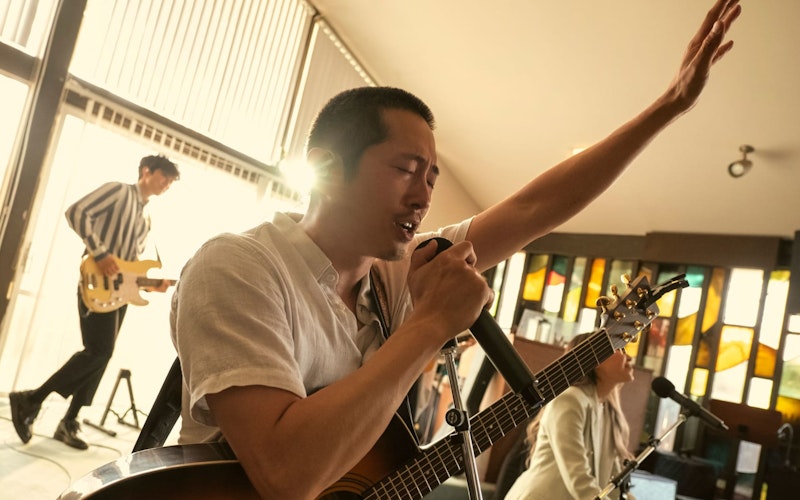
TV
Beef and Belief
Whether you believe revenge is a dish best served cold or are more inclined to turn the other cheek, Beef persuades us that while our journeys toward redemption are often clumsy and full of wrong turns, they can also be testimonies of God’s faithfulness.
The 10-episode Netflix series begins with a parking-lot altercation between Danny Cho (Steven Yeun) and Amy Lau (Ali Wong). Attempting to back out of a parking spot, Danny puts his used Tacoma in reverse and narrowly avoids crashing into Amy’s white Mercedes. The two exchange words, along with choice hand gestures, thus setting the table for a heaping serving of bloody-rare beef.
As we delve deeper into Danny and Amy’s pasts, we see that their anger is misplaced and that their personal lives are filled with failures and deep insecurities. It’s clear that Danny and Amy are depressed. Both have expressed suicidal ideations. The confrontation in the parking lot oddly invigorates them, eventually escalating into a larger feud. Their mutual hatred seems to give them a new lease on life. At the end of the first episode, Danny has tracked down Amy’s home address. Under the guise of his contracting business, he enters her residence and asks to use the bathroom. He then urinates in every area of the bathroom except the toilet. The episode ends in a slow-motion chase sequence, Danny grinning into the Los Angeles sunset while Amy, wild-eyed and yelling inaudible curses into the wind, chases after him as Hoobastank’s “The Reason” plays on the soundtrack. It’s a delectable appetizer to a remarkable first episode.
What makes this tale of retribution equally remarkable for me is how much the show gets right about a specific subset of Asian-American culture: Southern California, Korean-American church culture. The experience of watching Beef fully encapsulate this small but fiercely distinct cultural niche was surreal. Of all the (#iykyk) aspects the series gets right—men’s basketball fellowship, praise team social hierarchy, even a nod to Sara Lee pound cake—the scene that’s elicited the most visceral response, both positive and negative, occurs in the third episode. Still processing his thoughts of suicide, Danny visits a Korean-American church called Living Glory. He walks in during worship and is immediately leveled to tears upon hearing “O Come to the Altar,” an Elevation Worship song that is sung in churches around the world. Living Glory’s fictional praise team is a real-life praise team in a Korean-American church, which is why this particular rendition has an uncanny familiarity to it.
Though it’s undeniably specific in its Korean-American setting, the scene represents a broader cultural norm within the American church: the expected finality of a testimony. Personal testimonials are typically akin to 1980s television sitcoms in that God’s work must be wrapped up with a neat bow, self-contained within an easily digestible 30-minute time slot. A typical testimony follows an expected, three-act narrative arc: “My life was a mess. But I found God. Now my life is great.”
After this episode, however, Danny Cho’s life is anything but a typical church testimony. After experiencing this overwhelming emotional release, Danny joins the praise team and eventually becomes the church’s praise leader. But the cracks in his conversion begin to show. He uses the church to launder money from his unsavory business deals; he selfishly exposes the previous praise leader’s indiscretions for his own personal gain; and above all, he still harbors a deep craving for revenge towards Amy.
Beef explores a broader cultural norm within the American church: the expected finality of a testimony.
Here we witness Danny's real testimony, which resembles the testimony of the Israelites in the book of Exodus. Exodus is known for the clash between Moses and Pharaoh, the plagues, the miracles, and the first Passover. It’s a beautiful story that is wrapped up in a neat bow, culminating with the miraculous crossing of the Red Sea. But that portion of the narrative only occupies the first 14 chapters of a book that is 40 chapters long. Most of the story happens in the wilderness, where the Israelites are given the Ten Commandments and then repeatedly stumble as they try to live as people who now belong to God. As emotionally charged as the first 14 chapters of Israel’s testimony might be, it’s the rest of the mistake-filled, idol-worshiping, 26 chapters of Israel’s journey that provides the most relatable representation of our own testimonies.
In an NBC News article on Beef, Kimmy Yam and Soo Youn write with striking accuracy about “the duality of how the church is portrayed as both sacred refuge and a means to an immoral end.” The accuracy of Danny Cho’s ongoing, duplicitous, wilderness-like journey is Beef’s theological meat and potatoes (or, more specifically, its theological kimchi and rice). It’s in the wilderness where, like Danny, we make our mistakes, we serve with muddled intentions, and we have selfish motives prompted by instinctive desires of self-preservation, all while trying our hardest to make sense of ourselves and our neighbors.
Most importantly, it is in the wilderness where we learn how to live as people who have been redeemed by the mighty outstretched arm of God. The underlying constant of Israel’s testimony is intertwined with ours: that God remains faithful to us and not the other way around. To believe in God’s unwavering faithfulness despite all our wilderness wanderings is a radical belief. In it, we find that our only comfort in life and in death is directly owed to the unwavering patience and mercy of God, which finds its ultimate expression in Jesus Christ. Although I won’t get into the specifics of how Danny is redeemed—the ending is too good to even offer a hint of a spoiler—this is the inherent hope that is found in Beef, as well. It’s a testimony worthy of telling in any cultural context.
Topics: TV